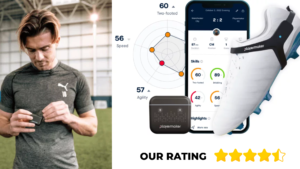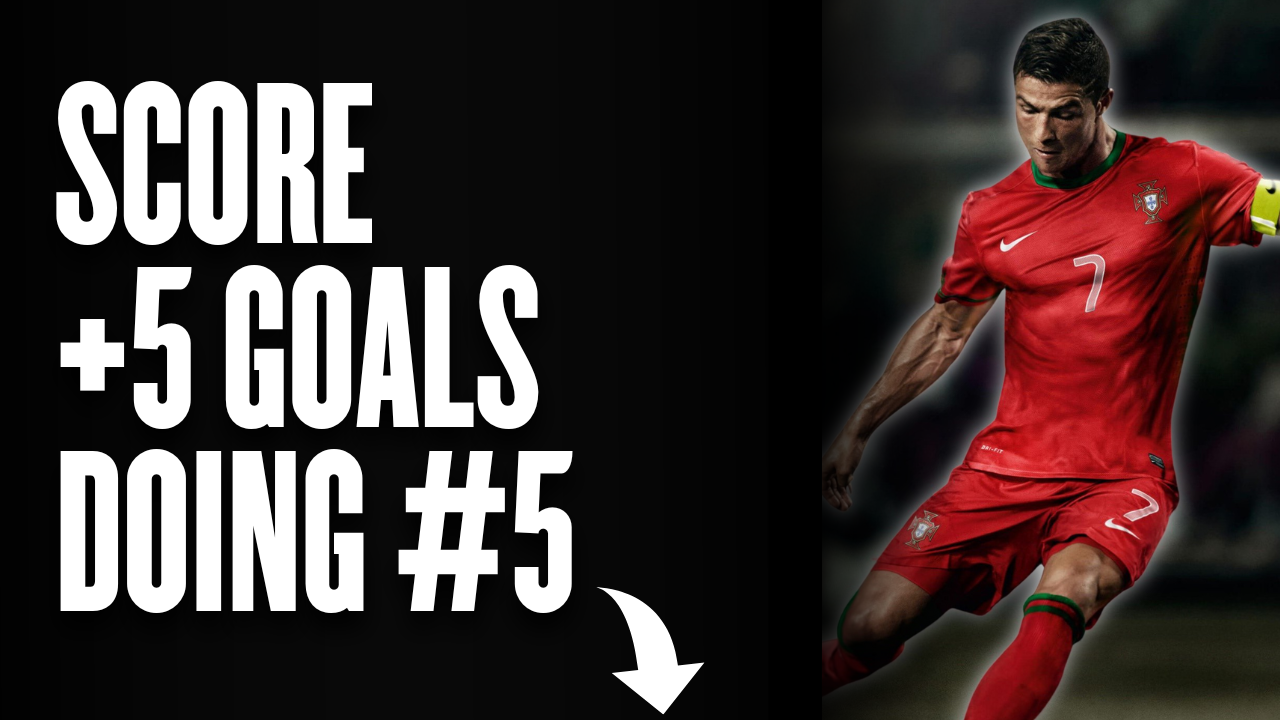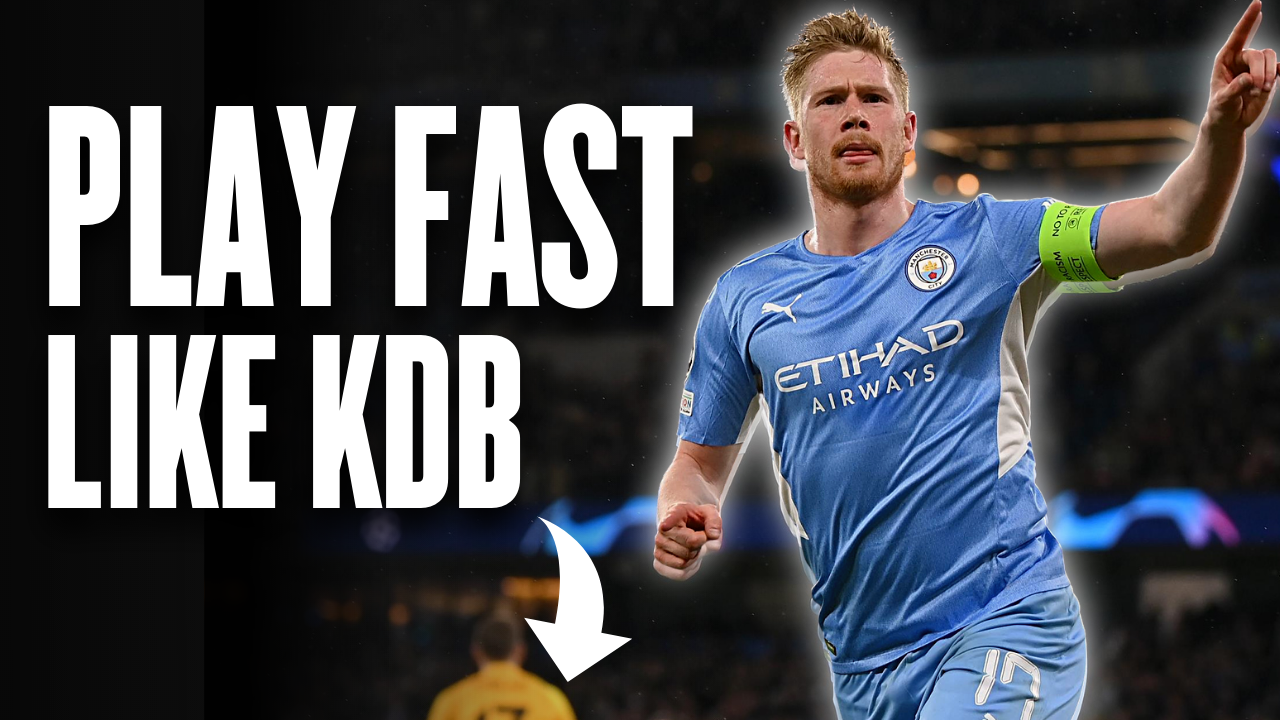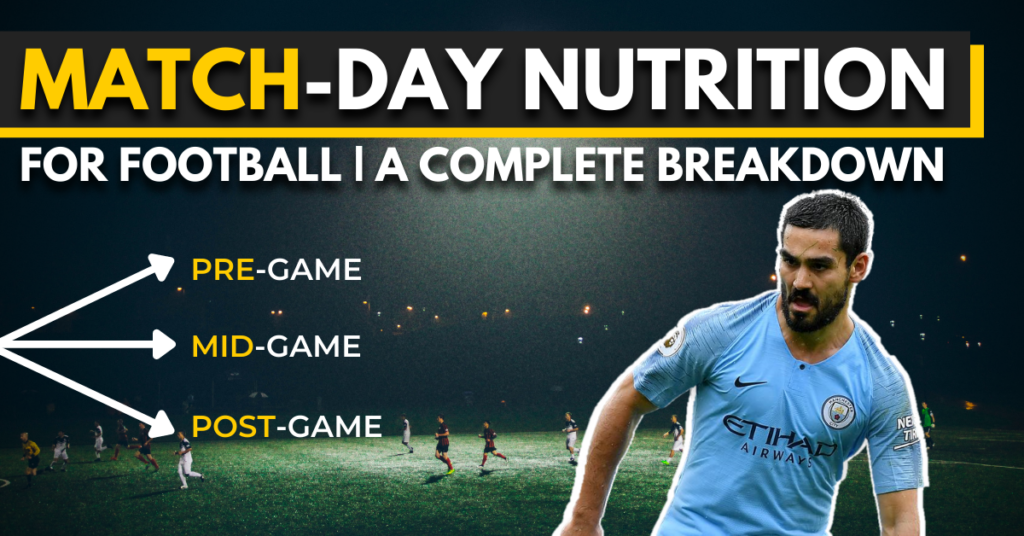
When it comes to match-day performance, nutrition plays a big part in how well you perform. One could argue that your nutritional choices leading up to a game (but also during the game) can literally make or break your performance. Is this true though?
We have talked about performance many times before and accepted that it is multifactorial. There’s so much that comes into play; technique, tactics, strength, power, speed, conditioning, psychology, etc.
However, your success in all of those areas and your well-being in general, are massively influenced by your nutritional behavior.
Having said that, the overall conclusion is that if you wanna perform like an elite-level athlete, you certainly have to eat like one.
In this article, we are going to write about everything match-day and nutrition-related. We are going to break down your game-day into three main meals and snacks (pre-/mid-/post-game) and outline all the details in regard to;
- the timing of your meals
- the macronutrient content of your meals
- the portion sizes
- what to avoid
- what to prioritize
RELATED: A Footballer’s Diet Plan | This Is How To Create Yours
NOT IN THE MOOD TO READ AN ENTIRE ARTICLE? WATCH THE YOUTUBE VERSION OF IT!
Match-Day Nutrition – The Pre-Match Meal
The pre-match meal is usually consumed somewhere between 3 to 5 hours before the game to allow adequate time for digestion and absorption. The main objective of this meal is to further load your glycogen stores through the consumption of carbohydrates – primarily simple ones.
Carb-Loading
The approach we usually like to adopt with our athletes when it comes to match-day nutrition is carb-loading. The reason behind this is that glycogen (the bi-product of carbohydrate digestion) is your body’s primary source of energy during a game of football.
Given that you’ve loaded on carbs the days and night before the game, you’re still going to continue loading on carbs. However, the key distinction between your pre-game meal and all those other carb-loading meals is the carbohydrate type you’re going to prioritize – your carb intake remains similar to the other carb-loading meals (50-70% of your plate consists of simple carbs).
RELATED: Carb-Loading For Football | Everything You Need To Know
Because it is your last meal before the game, you’re basically seeking a carb source that is quick and easy to digest and absorb. This means that simple carbohydrates are the way to go, providing you with a rapid boost of glycogen without keeping your digestive functions active for long periods of time.
RELATED: 10 Lunch Ideas For Football | Meals High In Carbohydrates

*As an affiliate, I'm earning from qualifying purchases without any extra charges being placed on you.
Protein & Fats
In addition to simple carbohydrates, you might as well include protein in your meal. Don’t go heavy with it. Choose a moderate portion and prioritize lean protein sources as much as possible.
The reason behind that is that we want to limit your fat intake before the game, as this might make you feel heavy and lethargic. Aim for 20% protein and 0-10% healthy fats.
Vegetables
Lastly; vegetables. Vegetables are rich in dietary fiber which can cause major discomforts during your performance such as bloating. This is also the reason we wanna avoid complex carbs pre-game. If you want to include vegetables in your pre-game meal, feel free to do so but be careful with what vegetables you choose (experiment on training days and choose the ones that don’t affect you) and their portion sizes.
What To Avoid
Generally speaking, you should avoid foods and liquids that don’t make YOU feel and perform well. This could be anything from a high dietary fiber intake to high GL (Glycemic Load) foods that could really mess up your blood sugar levels leading up to kick-off.
Here’s a list of the things you should keep an eye on and (possibly) avoid or regulate;
- Dietary fiber-rich foods – complex carbohydrates, vegetables, fruit
- High GL (Glycemic Load) foods such as processed sugar
- Spices and sauces that can cause stomach discomfort
- Too much protein (protein is rich in fiber)
Recommended Pre-Game Meal
Gluten-Free Spaghetti with Tomato Sauce & Chichen Breast
HIGH-CARB/PRE-GAME MEALS – 10 Lunch Ideas For Football | Meals High In Carbohydrates
HIGH-CARB/GAME-DAY BREAKFAST MEALS – 10 Breakfast Ideas For Football | This Is What You Need To Eat
Match-Day Nutrition – The Mid-Match Snack
Football is a game with a lot of high-intensity efforts throughout the whole 90 minutes. This high intensity and long-lasting activity can lead to a significant depletion in terms of fluids, glycogen (the bi-product of carbohydrate digestion), and minerals (electrolytes).
This depletion can negatively affect your performance. More fatigue, a drop in cognitive performance, marginal losses in sprint and change of direction speed, silly mistakes because of split-second decision-making mistakes, are just some of the negative side effects malnourishment can cause to your game.
That is why you need to take advantage of the half-time recovery window. Your objective is to relax, calm down, and gather important information for the second half.
On top of that, you need to have a nutritional strategy laid out ready to use at half-time. So, let’s break down what you’ll need in order to get back into the second half ready to go.

*As an affiliate, I'm earning from qualifying purchases without any extra charges being placed on you.
Fluids
During high-intensity activities, such as football, your body loses lots of fluids because of homeostasis; a process that regulates and stabilizes your body’s internal functions despite the changes that happen externally.
One homeostatic mechanism (a thermoregulatory mechanism) is the production of sweat. It is through sweat that your body loses lots of fluids. Excess sweating can even lead to dehydration if the athlete isn’t adequately hydrated or doesn’t re-hydrate.
The first thing you want to plan as part of your half-time nutrition ritual is rehydration. Have water ready for consumption! Anything between 200-300ml should be enough though. Don’t go overboard with it as this could lead to stomach cramps and heaviness. Throwing in an electrolyte tab would be ideal!
RELATED: Hydration For Football Players Made Simple | Everything You Need To Know
Glycogen
As we’ve mentioned, glycogen is your body’s primary energy source in football. Glycogen is stored in your skeletal muscles and liver for immediate use when needed. The first half of a match might not completely deplete your glycogen stores but it definitely leads to a significant reduction of its content. Therefore, boosting up your glycogen stores can really make a difference in the second half.
Just like the pre-game meal, we’re looking for a carbohydrate source that is quick and easy to digest and absorb. Simple carbohydrates are the way to go again. Fruits, like bananas or apples, are great examples. Oat and granola bars can also be good alternatives. Experiment with yourself and find what works best with your system.
RELATED: Carb-Loading For Football | Everything You Need To Know
Minerals (Electrolytes)
Minerals such as Sodium, Magnesium, Calcium, etc. are directly linked to neuromuscular function. Extensive activity can lead to a depletion of minerals, both through sweat and muscle activity.
A significant reduction in minerals can cause an electrolytic imbalance, one of the believed causes of muscle cramps. This is something you need to combat and deal with in order to avoid muscle cramps and prolong/ensure peak performance.
It is recommended to consume foods and fluids high in minerals. This can be in the form of fruits (bananas are packed with minerals and simple carbohydrates), energy/carb gels, electrolyte tabs/powders poured in your water, isotonic drinks, etc.
RELATED: Muscle Cramps In Football – This Is How To Get Rid Of Them
What To Avoid
- Overeating/Drinking too much water – this can cause stomach cramps and a heavy feeling
- Eating protein-rich foods and snacks – not a priority!
- Neglecting any of the steps mentioned (rehydrate, replenish)
Recommended Mid-Game Snack
A Medium Banana with 250ml of Homemade Isotonic Sports Drink
HALF-TIME SNACKS: 15 Great Snacks To Boost Football Performance
HOMEMADE SPORTS DRINK: Sports Drinks – Hypotonic, Isotonic, Hypertonic | What’s The Difference & How To Make One At-Home
Match-Day Nutrition – The Post-Match Meal
The final whistle has been blown. An elite athlete starts preparing for the next game right away.
But how?
Recovery is the first step.
Your post-game meal(s) should emphasize recovery and the overall regeneration of your body. A 90-minute game is a heavily taxing activity for both your body and mind. Your goal should be to repair broken muscle tissue, replenish all the fluids and nutrients you’ve lost, and take care of your brain health.
RELATED: How To Recover After A Football Match | Backed By Science
Replenish
It is natural for your body to make complete use of your glycogen and mineral stores. This means that you’re stepping out of the field with limited glycogen and minerals inside your body. Your goal should be to bring those back at their normal levels.
This can happen through isotonic drinks and/or regular food choices. It is generally recommended to quickly consume simple carbohydrates again, but a mix-up with complex ones would also be considered good.
Rebuild
Protein is considered the most important macronutrient when it comes to recovery since it is the building block of muscle tissue. A meal content anywhere between 30 to 60gr would be great after the game. Since digestion isn’t a major issue after the game, feel free to choose any protein source you enjoy. Obviously, the less its fat content the better.
Fats
Healthy, Omega 3 fats are linked to brain health and cognitive function. Your CNS (Central Nervous System) was working overtime today along with your muscular system to be as efficient and effective on the field as possible. Include one source of healthy fats in your meal and let it make up approximately 20% of your plate.
Take care of your brain!
What To Avoid
- Alcoholic drinks can slow down recovery
- Don’t delay the consumption of your post-game meal (<2 hours)
- Undereating – don’t restrict yourself, you need to recover!
- Eating just before bed (not ideal for sleeping quality) – if necessary, eat and allow yourself some time for digestion
Recommended Post-Game Meal
Steak with Baked Sweet Potato & Greek Yoghurt Parfait with Nuts, Seeds & Fruit
HIGH-PROTEIN/POST GAME MEALS – 10 Dinner Ideas For Football | Meals High In Protein
Match-Day Hydration
Hydration plays a key role in keeping all your performance indexes close to their peak. On top of that, proper hydration lubricates your joints, supports cognitive function, minimizes the risk of muscle cramps, etc.
Having said that, it makes absolute sense to keep your fluid levels high on game-day; an instance where your body loses lots of fluids through sweat.
As a rule of thumb, try to achieve ⅔ of your daily water intake goal before you step out on the field. This would roughly be around 30-40ml of water per 1kg/2.2lbs of body weight. Sipping water throughout the whole game is also key to sustaining high fluid levels in-game.
In regard to post-game hydration, you can weigh yourself before and after the games and drink 800ml-1L of water for every 1kg/2.2lbs of bodyweight you lost. This is a method many elite teams and athletes use to properly rehydrate after a game.
The use of electrolyte supplements or the consumption of hypo-/iso-/hyper-tonic sports drinks is also advised!
RELATED: Hydration For Football Players Made Simple | Everything You Need To Know
Conclusion – Match-Day Nutrition Cheat-Sheet
This article covered a range of different topics in regard to match-day nutrition for football. This wide range of information might have confused you a bit. Therefore, I’d suggest going over the whole article once again to really absorb every ounce of information there is and apply it to your game-day strategy.
However, we’d also like to break down the whole day into much smaller pieces and help you gain awareness of your objective with every meal or snack you consume. That’s why we created this! Feel free to print and use this cheat sheet on a weekly basis to properly fuel your performance.
You can find all the recommended meals plus many more by clicking one of the links below;
- Breakfast Ideas For Football | This Is What You Need To Eat
- Lunch Ideas For Football | Meals High In Carbohydrates
- Dinner Ideas For Football | Meals High In Protein
- 15 Great Snacks To Boost Football Performance
- Top 10+1 Drinks For Football Players | Performance & Recovery
Also, here’s the video version of this article. It will certainly help all of you guys that have a hard time digesting plain theory without visual context. Enjoy!
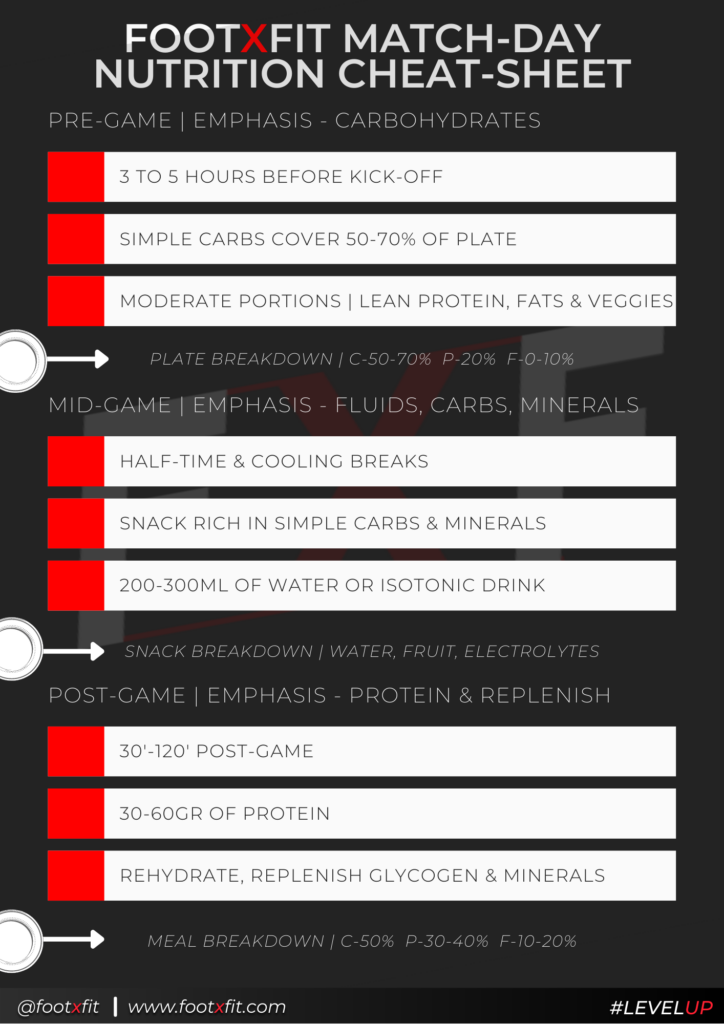
Liked this article? Make sure to SHARE it with your teammates and coaches! Also, don’t forget to follow us on INSTAGRAM where we post daily content to help you #levelUP your performance!
REFERENCES
[1] Kantorowski et al., 1990, P.G. Kantorowski, W.D.B. Hiller, W.E. Garrett, P.S. Douglas, R.O.M. Smith, Cramping studies in 2600 endurance athletes, Med. Sci. Sport. Exerc., 22 (2) (1990), p. s104
[2] Gaia Giuriato, Anna Pedrinolla, Federico Schena, Massimo Venturelli, Muscle cramps: A comparison of the two-leading hypothesis, Journal of Electromyography and Kinesiology, Volume 41, 2018, Pages 89-95, ISSN 1050-6411, https://doi.org/10.1016/j.jelekin.2018.05.006. (https://www.sciencedirect.com/science/article/pii/S1050641118300919)
[4] Maughan RJ, Shirreffs SM, Leiper JB. Errors in the estimation of sweat loss and changes in hydration status from changes in body mass during exercise. J Sports Sci 2007: 25: 797–804. Crossref PubMed Web of Science® Google Scholar
[5] Bergeron MF. Heat cramps: fluid and electrolyte challenges during tennis in the heat. J Sci Med Sport 2003: 6: 19–27. CAS PubMed Web of Science® Google Scholar


